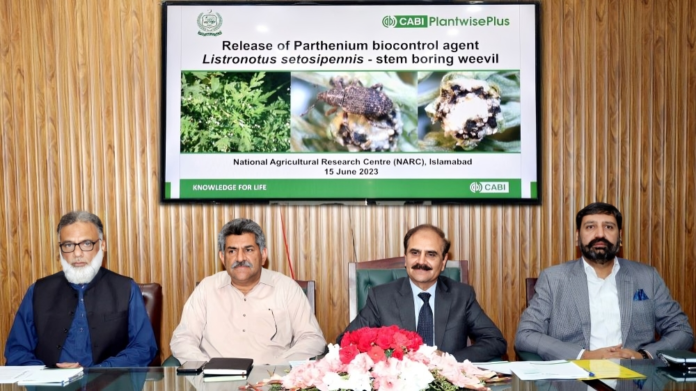The Plant Protection Department has authorized the Centre for Agriculture and Bioscience International (CABI) to import agriculture biocontrol agents from Australia. This initiative is aimed at combating the invasive parthenium weed in an environmentally sustainable way, minimizing the country’s dependence on hazardous chemical pesticides.
CABI, a UK-based non-profit organization dedicated to scientific research, has been leading efforts to control parthenium in Pakistan since 2017, employing agriculture biocontrol agents as a safer alternative to chemical methods.
These biocontrol agents specifically target parthenium, providing a solution that avoids harming other plant species or the environment. The initiative has been praised for its long-term sustainability and for reducing the risks associated with toxic chemicals, which are harmful to both human and animal health.
CABI’s Role in Combating Parthenium
CABI’s efforts have been instrumental in raising public awareness and training farmers in effective parthenium management techniques. Through its Action on Invasives program, CABI has collaborated with government agencies and universities to educate farmers and communities about the dangers of parthenium and the benefits of using agriculture biocontrol agents.
Last year, CABI released its first biocontrol agent—a type of weevil imported from South Africa—after years of rigorous testing in quarantined labs. This release marked a significant milestone in Pakistan’s fight against parthenium, with the biocontrol agents targeting the weed without posing any harm to surrounding crops or vegetation.
The Threat of Parthenium Weed
Parthenium, also referred to as famine weed, is recognized globally as a highly invasive species that poses serious threats to agriculture and public health. Experts warn that parthenium can drastically reduce crop yields by as much as 90%, while also causing severe allergies and diseases in both humans and livestock. The weed, which is native to tropical America, has spread to 48 countries worldwide, including large regions of Africa, Asia, and the South Pacific.
In Pakistan, parthenium entered from India in the 1980s and has since spread rapidly, impacting both rural and urban landscapes. Its proliferation has damaged local ecosystems and continues to threaten major food crops, such as wheat, rice, and maize, in key agricultural regions.
Advantages of Agriculture Biocontrol Agents
The use of agriculture biocontrol agents offers numerous advantages, especially when compared to chemical pesticides:
- Environmentally Safe: Biocontrol agents are highly specific to their target species, minimizing any risk to non-target plants or animals. This makes them an eco-friendly alternative to toxic chemicals.
- Long-Term Effectiveness: Once established, biocontrol agents continue to suppress the target species, providing a cost-effective solution over time.
- Reduced Human and Livestock Health Risks: The avoidance of harmful chemical pesticides significantly lowers the risk of adverse health effects in both humans and animals.
Multi-Biocontrol Agent Approach
Abdul Rehman, Deputy Director of Projects Implementation and Research at CABI, emphasized the importance of a multi-biocontrol agent approach in effectively managing the parthenium weed in Pakistan. He explained that many countries affected by parthenium, such as India, South Africa, Ethiopia, and Sri Lanka, are using integrated pest management approaches that involve biocontrol agents in combination with other sustainable methods.
Rehman also noted that Australia, one of the leading countries in parthenium management, has successfully deployed 11 different biocontrol agents for the weed’s control. Pakistan is now following a similar strategy with the recent approval to import two additional agents from Australia.
Challenges in Biocontrol Implementation
Despite the potential of agriculture biocontrol agents, there are significant challenges that hinder their implementation in Pakistan. Rehman highlighted that environmental factors, along with complex and time-consuming approval processes, have delayed the introduction of these agents. For instance, the first biocontrol agent required nearly four years of quarantine testing before receiving government approval.
Initially, the use of biocontrol agents was restricted to non-agricultural areas such as rangelands and controlled sites. Expanding their use to agricultural fields is critical, but slow progress in regulatory reforms and funding shortfalls continue to delay this process.
Rehman stressed the need for reforms in the regulatory approval system, suggesting that if an agent has been rigorously tested in countries like Australia or South Africa, Pakistan should expedite the local approval process. He also raised concerns that, even with permission granted to import two new agents, their release in Pakistan could still take up to five years unless the process is accelerated.
“By speeding up the release of these agents, we could see them deployed within a year of import,” Rehman urged, emphasizing the urgent need for faster implementation to combat the growing threat of parthenium.
Also Read: Pakistan-Russia MoU Signed to Transform Agriculture Sector
The introduction of new agriculture biocontrol agents marks a significant step in Pakistan’s efforts to control the invasive parthenium weed. With the backing of CABI and the approval of the Department of Plant Protection, Pakistan has the opportunity to adopt a more sustainable and environmentally friendly approach to weed management. However, success will depend on overcoming regulatory hurdles and securing the necessary resources to fully implement these biological control programs.
Also Read: Green Pakistan Initiative Boosts Agriculture Productivity


